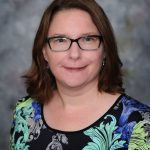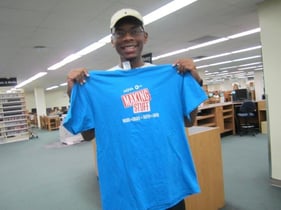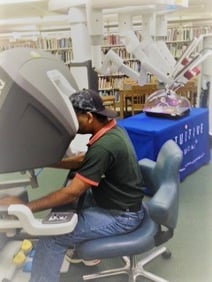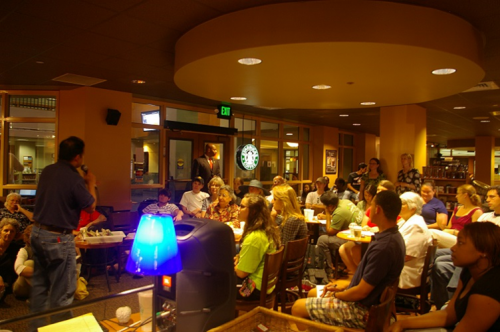 Tracy Englert is an associate professor and science and technology librarian at The University of Southern Mississippi. She has worked at the university since 2001, and her role includes providing traditional reference services to faculty and students. She handles instruction, reference desk duty, and collection development. As part of her outreach, she oversees science cafe series and NanoDays events. We caught up with Tracy for a Q&A session where she addresses the new, and more active role librarians should assume in their professions.
Tracy Englert is an associate professor and science and technology librarian at The University of Southern Mississippi. She has worked at the university since 2001, and her role includes providing traditional reference services to faculty and students. She handles instruction, reference desk duty, and collection development. As part of her outreach, she oversees science cafe series and NanoDays events. We caught up with Tracy for a Q&A session where she addresses the new, and more active role librarians should assume in their professions.
JoVE: Why is it crucial for academic libraries to host or organize science programming (such as Science Cafe), maker labs, or other similar endeavors?
Tracy: The mission of many libraries is to serve as the intellectual heart of the campus. Having this type of programming enhances this role. In addition, this is scholarly communication at its most basic. And the programming acts as a catalyst for information dissemination.
What did you do to receive buy-in from various campus stakeholders, for your activities?
Tracy: Collaborating and partnering is the main way to achieve buy-in from stakeholders on campus. Our university, like many others, has an honors college. Part of its requirements is that students must attend a special honors series, as well as optional events. I requested that the café serve the requirement for optional events. I also worked with instructors on providing extra credit for attendance. You can also look at collaborating with other student or campus groups. Does your university have a women studies major? Then consider having a café in conjunction with that area and Women’s History Month. Certainly, whenever a tie-in can be made to the curriculum, it works really well.
Usually in October, the American Chemical Society has a Chemistry Week. Geography Awareness Week is the third week of November. Also, look at what faculty has received external funding. Many of these funding agencies grants have requirements for the dissemination of the research, through public outreach and education. For off-campus stakeholders, I send out information on the events to local K-12 educators. It is so rewarding when a local high school teacher in the audience can make connections with a faculty presenter and a relationship results — where the faculty member is invited to the school and even works on research partnerships with high school students. This is also great, as the library is supporting the university’s goal of increasing admissions

And funding?
Tracy: Funding to carry out the series can often be provided through these partnerships —either through asking the partner to fund refreshments or by applying for funding. Many times, when I have collaborated with an agency such as PBS Nova Science, NISE Net, or National Geographic, I have received swag to hand out at these events — stuff like pens, DVDs, pencils, T-shirts, coasters, and temporary tattoos, or other promotional items. We are fortunate to have a Starbucks in the library, so it often provides a discount for café attendees.
How has the Science Cafe series helped the library promote its services and resources?
Tracy: I always make sure to promote our Friends of the Library group. Many of our off-campus speakers have ended up joining our Friends group. As I mentioned, having a tie-in to curriculum works well. For the cafes, I promote associated library resources. For examples, if we hosted a café on Earth Day and Herpetology, I am sure to provide a bibliography of frog resources. The cafes have also facilitated my liaison responsibilities and duties. Through these events, I have made strong lasting relationships with faculty and students. I have received several requests from faculty to include the café and university library in their proposals to funding agencies (as demonstrations of broader impact and dissemination). The cafes have also assisted with collection development. When preparing my list of associated resources, if I find that the library has some weakness in certain areas, I make sure to take note and beef up those areas. Or at the very least, I add missing resources to a future wish list.
What were the most successful strategies employed to ensure high attendance?
Tracy: Partnership is key. Working with the university honors college. Working with instructors who want to offer extra credit. In addition, if something is a hot topic in the community, then you will see those [attendance] numbers go up.
What advice would you give other science librarians who would like to start a science programming series such as Science Cafe?
Tracy: Do your research! Perform an evaluation of your community. Is some type of programming series already going on? If so, could you successfully supplement it? If not, what partnerships are your faculty are already working on? Can you help them with those efforts? Is there a topic of interest to your local community? Oklahoma State Library launched a successful series by focusing on hydraulic fracturing. Many resources are out there about cafes.

I also recommend that you are flexible and adaptable. Some of my most successful cafes occurred when I went out of the box. For example, I had a local surgeon who performed robotic-assisted surgery with the da Vinci system get on the da Vinci roster to bring the robotic surgery machine to our library. It was great! The surgeon did a great talk on the issues surrounding this type of surgery. Then the da Vinci vendor did a tour of the machine and talked to the students about jobs at the Sunnyvale, California. In addition, the students and community members were able to try out the surgery machine. A once in the lifetime opportunity for many of the folks in attendance.
Does this experience change how you think of librarianship?
Tracy: It certainly changes librarianship from a passive, waiting-for-something model — to an active and engaged model where you are going out and promoting engagement with faculty and research. I feel that I am providing support to my faculty in its outreach and education efforts, supporting the intellectual needs of my students, faculty, and community, and being a better librarian overall.

